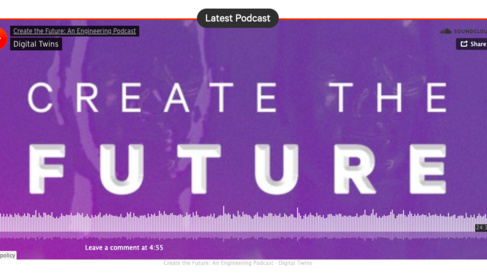
Chief Scientist at The Alan Turing Institute, Sir Kirby Laing Professor of Engineering and CSIC Academic Director, Professor Mark Girolami has been interviewed for the Create the Future: An Engineering Podcast from the Queen Elizabeth Prize for Engineering.
This podcast shines a light on the topic of digital twins and the emergence of AI as technologies shaping the future. Professor Girolami said: “This concept cuts across just about every sector you can think of – it’s having major impact across everything from agriculture, climate and weather to structural engineering. There isn’t any area that isn’t being touched by digital twins.”
Data-centric engineering is not new – what is new is the ability to gather data and to develop sensors and sensor systems to measure at all scales. Our ability to gather data on physical, natural and chemical processes and engineering systems has just exploded in the last 20 years. We now have the opportunity to find out about new complex processes via data in the same way that the founding fathers of various engineering disciplines did – but we can do that at scales and speeds never available before. Professor Mark Girolami, Chief Scientist, The Alan Turing Institute and CSIC Academic Director
A number of collaborative CSIC projects were cited during the conversation with presenter and science journalist Sue Nelson, including the first-ever 3D printed stainless steel pedestrian bridge that crosses the Oudezijds Achterburgwal canal in central Amsterdam. Professor Girolami emphasised the need for a multidisciplinary team from The Turing, Imperial College London, CSIC and 3D printing company MX3D to contribute a range of specialist skills required to address the challenges of creating the 12-metre long metal bridge, which was made additively with printing carried out by robots.
He said: “We had a team of material scientists, applied mathematicians, computer scientists and structural engineers working together to try and understand the property of the material, the structure of the material and the levels of integrity one can guarantee using this novel type of construction and material.”
An innovative sensor network was designed and installed on the bridge to create a ‘living lab’. Professor Girolami said: “We can monitor its heartbeat continuously and use this to study how the bridge performs both historically and into the future.”The data that comes from this physical asset provides a digital representation of the physical bridge – the digital twin. The team can take measurements from the bridge (the data) and fold them into the digital twin to play out scenarios to test the response of the structure to different factors, such as increase in ambient temperature and various loads. Professor Girolami said: “This coupling of the physical and the digital bridge allows us further insights into the performance of a novel structure constructed in a novel way using novel materials.Data-centric engineering is nothing new, but digital twins open-up a whole new world.”
Reflecting on the value of insights offered by data-centric engineering to existing and ageing infrastructure, Professor Girolami spoke of CSIC’s pioneering research and deployments to advance smart infrastructure and construction. He gave the example of the monitoring of a Victorian viaduct in Leeds that was identified by Network Rail as potentially in need of replacement. Data gathered from CSIC’s long-term and mixed sensor monitoring system of the viaduct provided evidence demonstrating the integrity of the bridge which allowed the asset to stay in service, avoiding considerable cost, carbon and disruption to travellers. “This is a good example of how data-driven methods of engineering allow better informed decisions,” said Professor Girolami. Discussion of digital twins also included the Growing Underground project, where a digital twin of the urban farm located 33 metres below the pavements of London’s Clapham High Street, in former World War II air raid shelters, is helping to optimise yields of micro greens grown by Zero Carbon Farms Ltd.for local restaurants.
Professor Girolami spoke about why data-centric engineering currently invites new possibilities and the need for multidisciplinary teams to optimise the opportunities of AI technologies: “Data-centric engineering is not new – the practice of engineering has always been centred around data, based on experimentation, measurement and ultimately gathering data to draw conclusions and infer laws. Engineers has been doing data-centric engineering forever.
“What is new is the ability to gather data and to develop sensors and sensor systems to measure at all scales. Our ability to gather data on physical, natural and chemical processes and engineering systems has just exploded in the last 20 years. We now have the opportunity to find out about new complex processes via data in the same way that the founding fathers of various engineering disciplines did – but we can do that at scales and speeds never available before.”
He concluded: “We need engineers who are interested in everything. We need multidisciplinary teams of mathematicians, computer scientists, ethicists, engineers and artists. Bringing a range of skills together to create the 3D bridge was pivotal to success and this is happening across engineering – the breaking down of silos and becoming much more diffuse.”
• Listen to the podcast here.
• New episodes of ‘Create the Future: An Engineering Podcast’ are available every other Tuesday at www.qeprize.org/podcasts
